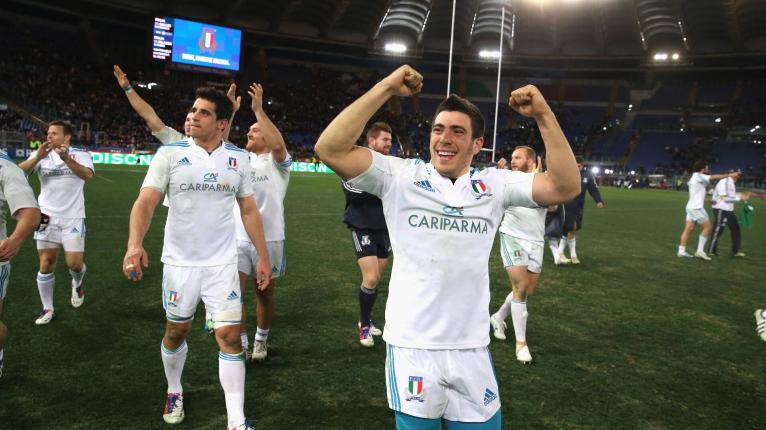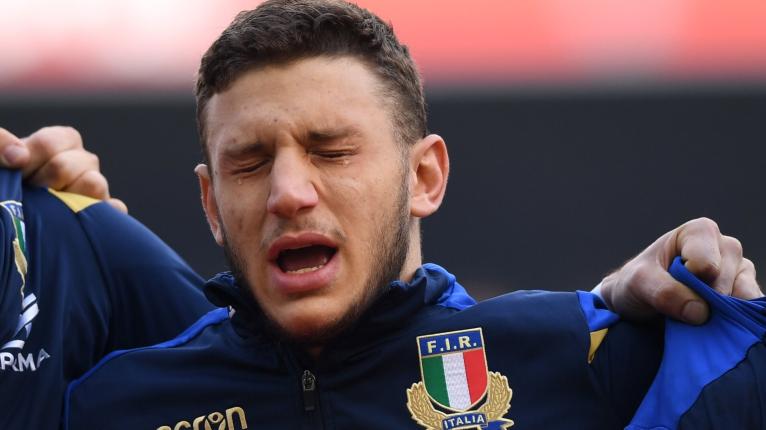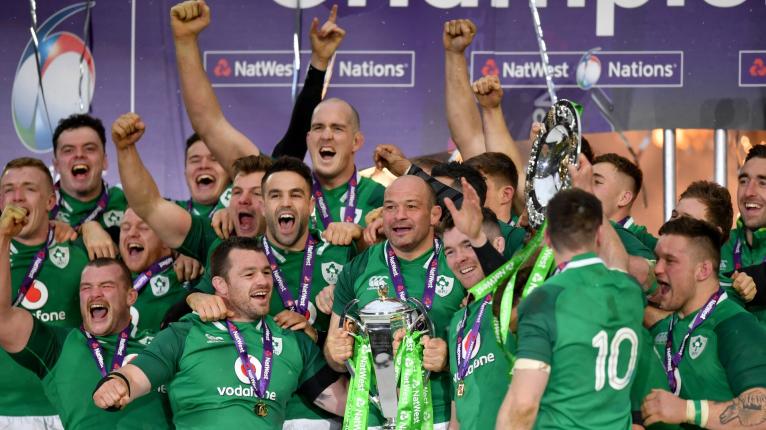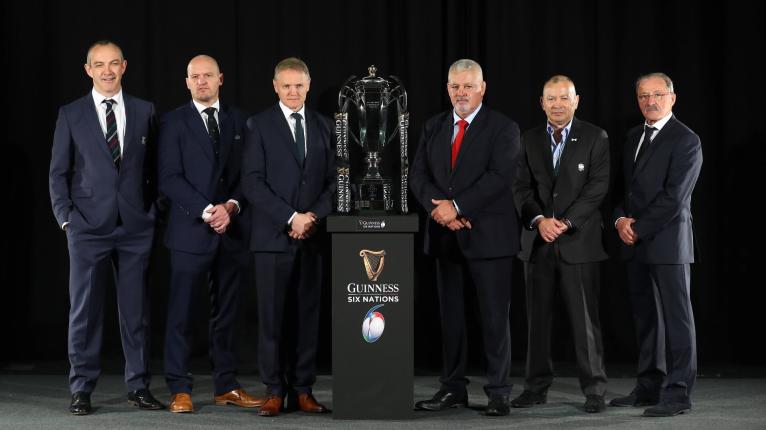'We're disconsolate, disillusioned, disappointed after a defeat... but don't do this job if it's not hurting'

Italy-Ireland games have a special place in the heart of Azzurri boss Conor O’Shea, the former Irish full-back. Take the giddiness he felt in the build-up to last year’s Six Nations encounter, the first time he was taking his team back to his homeland.
“It’s brilliant and I’m actually going to stay for a few days before Italy get together again because it’s my mother’s 80th around this time,” he told this writer 12 months ago about that impending visit to Dublin.
“I’ll stay around for a couple of days and I even said to Joe Schmidt at the Six Nations in London launch that hopefully we will meet up for a coffee in and around Terenure, see what weaknesses he pulls us apart on. I’m sure he will open up after the game, not before it.”
The pity about the incessant enthusiasm the former Premiership-winning Harlequins boss brings to his role is he didn’t take the reins a few years before he eventually agreed to do so in 2016. An earlier arrival might have helped to better treat the rot that has greatly stunted the development of Italian rugby.
Just six wins in 30 outings is sad proof of the daunting job of work O’Shea is handling, picking up the pieces after Italy dramatically fell off the face off the face of the earth when failing to build on their rich promise of 2013.
(Continue reading below…)
The die was supposedly cast six years ago. That Italy, having beaten Ireland and France in the Six Nations in Rome, had finally arrived in the big time and were all set to motor on. They weren’t. Damagingly so.
Long-serving Edoardo Gori tackled this nuclear then-and-now landscape in the recent edition of the Rugby Journal magazine. “After 2013, the Italian momentum seemed to stop and the Irish built to become the best side in the world,” he shrugged.
“Six years ago we beat them and now they are on another planet. We have to understand how they did it. Rugby overall has changed a lot. The level of international rugby is a lot better. All the teams have got better, not just on matchday but the preparation, the processes, the post-match analysis.

“Without oxygen you can’t do anything, so we have to be fit. Then we work on mindset, preparation, how to deal with every moment and be competitive. Conor started to work on this from the start: our fitness, our belief, our passion,” said Gori, who at least had the silver lining that his injury in last year’s Dublin encounter coincided with him meeting his current girlfriend that day.
“Conor understood very well where we were and what we have to work on. It’s not easy, though. He’s not a wizard. He has had to do a plan for seven, eight, nine years because other team don’t wait for us as nobody stands still. He’s been working around Italy trying to help the coaches to be better. He’s doing a great job, but of course he needs a club team that is competitive if he wants to steal wins for Italy.”

Dean Budd, the second row who joined a hugely competitive Treviso in 2012 and then watched it disappear through the cracks, fully agreed. Recent improved Italian performances have coincided with a club scene revival where the now-called Benetton will finish this weekend’s PRO14 action occupying second spot in their seven-team conference. That’s no mean feat.
“The national team really flows on from the club success. In 2013, when Italy has that success, it was Benetton’s best year in their history and that was a massive flow on from a very successful club campaign,” Budd told RugbyPass this week during preparations for Sunday’s round three Stadio Olimpico encounter.
Dean Budd's emotional Six Nations tribute to his step-dad Pete 😢🇮🇹✈️🇳🇿 https://t.co/fuBDJalUtx
— RugbyPass (@RugbyPass) February 21, 2019
“Now at Benetton we’re starting to get things really good and Zebre, they are a little bit slower because they have a lot more to do, a lot more infrastructure to put in place. There is actually a process of building here now. It’s a slow one compared to Ireland, but Italy are looking to build things from the ground up which takes time. Fans obviously aren’t alway happy with the results, but that is not that way not works.
“Ireland invested into their rugby to be where they are now and it’s a very clear result there. They have invested money, effort, time and resources into getting the best people in the world involved and they have got the results from it.
“With Italy, there isn’t quite the depth of the system that Ireland have and behind the scenes they didn’t develop the academy. But just now, as a Benetton player, we’re starting to see signs that it’s beginning to come right.”

Will those signs be enough for O’Shea to remain at the Italian helm beyond the 2019 World Cup in Japan which is currently Schmidt’s planned sayonara as Ireland coach? One big win could change everything in the eyes of a federation that has been doing some backroom glad-handing, allegedly canvassing the interest of Racing duo Laurent Labit and Laurent Travers in taking up the position.
Impatience on the Italian federation’s part would be wrong given it was their own lack of investment and an ignorance of the bigger grassroots picture that were critical parts in why the rot commenced in the first place following 2013’s Six Nations high.
Unlike O’Shea, who was left unenviably picking up the pieces in 2016 of all that shredded promise, Schmidt’s Ireland fix was a far easier challenge. He’d been in the Leinster system, knew the lie of the land and instinctively set about turning potential into prizes to quickly move the national team on from the low ebb that was a fifth place Six Nations finish in Rome and a drop to a worst ever ninth position in the World Rugby rankings.
Schmidt’s hands have never been tied regarding resources. Every tiny detail is forensically analysed and provided for, everything right down to the provision of individualised mattresses to ensure better sleep (another batch were recently ordered).

It’s the type of financial muscle that is keeping Italy lagging behind their Six Nations rivals by a country mile and with that sort of mismatch, O’Shea’s enthusiasm should be treasured by his employer, not threatened.
“It’s a long, hard slog to change something that hasn’t been changed before,” admitted O’Shea who lives in Sirmione on the shores of Lake Garda, the picturesque town equidistant between Treviso and Zebre, the franchises who are improving under Kieran Crowley and Michael Bradley.
“They are a great people, they want it [success] and I’m not talking the players, I’m talking supporters, the Italian media. We are all really disconsolate, disillusioned, disappointed after a defeat. That is the nature of sport, but don’t do the job if it’s not hurting. It needs to mean something.
“We have the lowest budget in the Six Nations, so we have to be very systematic in how we go about these things. We have to be clever with our fitness. We cannot break the players, can’t just flog them and say ‘we have got 20 more where you have come from’. We have to just do it slowly.

“It’s a different culture and you can’t go against the culture, but we can learn from Italian life. I’m lucky to be Irish. Irish and Italian people have a lot in common in terms of family, food and drink in a good way, a good time in each other’s company.
“But trying to instigate change within that culture, there is a reticence, a slowness, to embrace change. ‘Why should we change? We have always done it like this.’ It’s about marrying all that up.
“I really believe what we are building now is something that over the next four to six years is going to be a team that is going to stay together and have a lot of ability within it. As we develop that depth I talk about, that competition will start spurring people on and we will be more competitive.
“I just want to look back and say I have done what I feel is my best and what is right for Italian rugby. If that means in four years’ time I’m watching someone else with this team getting great results, I don’t care. I just want to do what is right and hopefully we get that opportunity.”





































